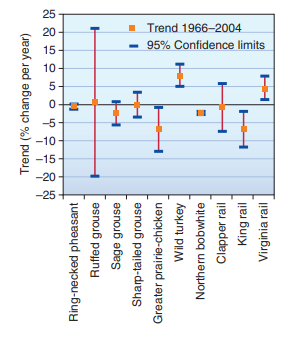
Principles of Environmental Science 7th Edition by William Cunningham,Mary Cunningham
Edition 7ISBN: 978-0071314947
Principles of Environmental Science 7th Edition by William Cunningham,Mary Cunningham
Edition 7ISBN: 978-0071314947 Exercise 7
Confidence limits in the Breeding Bird survey
A central principle of science is the recognition that all knowledge involves uncertainty. No study can observe every possible event in the universe, so there is always missing information. Scientists try to define the limits of their uncertainty, in order to allow a realistic assessment of their results. A corollary of this principle is that the more data we have, the less uncertainty we have. More data increase our confidence that our observations represent the range of possible observations.
One of the most detailed records of wildlife population trends in North America is the Breeding Bird Survey (BBS). Every June, volunteers survey more than 4,000 established 25-mile routes. The accumulated data from thousands of routes, over more than 40 years, indicate population trends, telling which populations are increasing, decreasing, or expanding into new territory. To examine a sample of BBS data, go to Connect, where you can explore the data and explain the importance of uncertainty in data.

A central principle of science is the recognition that all knowledge involves uncertainty. No study can observe every possible event in the universe, so there is always missing information. Scientists try to define the limits of their uncertainty, in order to allow a realistic assessment of their results. A corollary of this principle is that the more data we have, the less uncertainty we have. More data increase our confidence that our observations represent the range of possible observations.
One of the most detailed records of wildlife population trends in North America is the Breeding Bird Survey (BBS). Every June, volunteers survey more than 4,000 established 25-mile routes. The accumulated data from thousands of routes, over more than 40 years, indicate population trends, telling which populations are increasing, decreasing, or expanding into new territory. To examine a sample of BBS data, go to Connect, where you can explore the data and explain the importance of uncertainty in data.

Explanation

This question doesn’t have an expert verified answer yet, let Examlex AI Copilot help.
Principles of Environmental Science 7th Edition by William Cunningham,Mary Cunningham
Why don’t you like this exercise?
Other Minimum 8 character and maximum 255 character
Character 255


